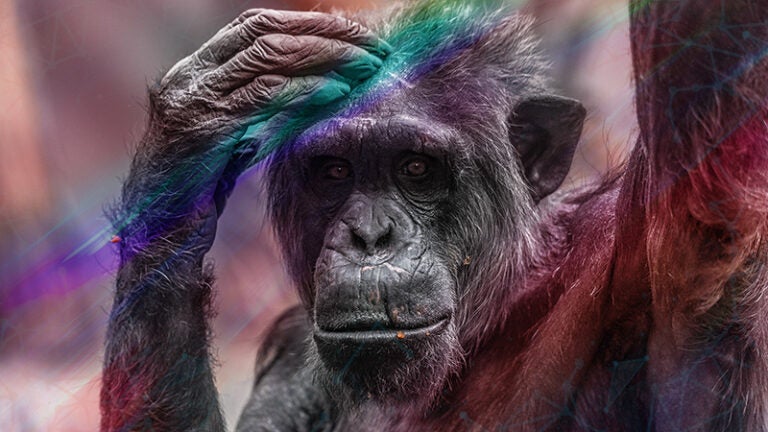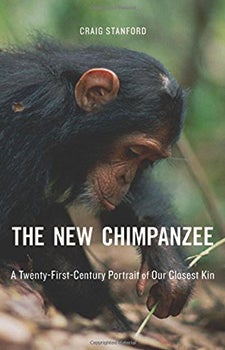
Wild chimps can teach us about aggression, communication and social behavior
Staging political coups, waging wars over territory, passing on cultural traditions to younger generations, ruthlessly strategizing for resources — including sexual partners. Sound like familiar human behaviors? Well, they are. But they’re also behaviors we share with wild chimpanzees.
Primatologist Craig Stanford, professor of biological sciences and anthropology at USC Dornsife, has been studying the creatures for more than 25 years. His new book, The New Chimpanzee: A Twenty-First-Century Portrait of Our Closest Kin (Harvard University Press, 2018), synthesizes his own pioneering research with that of all six other major research studies done to date. In it, Stanford portrays a complex and even more human-like ape than the one celebrated British primatologist and anthropologist Jane Goodall popularized more than a half century ago.
“The book contains what we have learned for the last 20 years about wild chimps,” Stanford said. “By extension, this knowledge helps us realize who we are, because we’ve always used them as a window onto ourselves.”

In his new book, Craig Stanford synthesizes 20 years of research experience.
Recent discoveries about wild chimpanzees have dramatically reshaped our understanding of these great apes and their kinship with humans. We now know that chimpanzees not only share much of our behavior but also have genomes similar to our own, despite the fact that chimpanzees and humans have gone their separate ways for more than 6 million years since diverging from a common ancestor.
Stanford’s book also sounds an urgent call for the protection of our nearest relatives at a moment when their survival is at risk.
Chimpanzees are rapidly disappearing as their forests are cut down and people in some parts of Africa still eat them,” Stanford said. “And there’s a lot to be learned still.”
Divided into 10 chapters, each one concentrating on a different theme, Stanford’s book explains what the past two decades of chimpanzee field research has taught us about the origins of human social behavior, the nature of aggression and communication and the divergence of humans and apes from a common ancestor. The result is a work that adds to our knowledge of chimpanzees’ political intelligence, sexual power plays, violent ambition, cultural diversity, and adaptability.
Among the topics explored is Stanford’s own ground-breaking research on meat-eating and hunting behavior among wild chimps — research he began in the 1990s following Goodall’s discovery that chimpanzees are not vegan, as previously believed.
One of the first people to research the subject, Stanford said the debate still rages on about why chimps eat meat.
“I took the position early on that it’s not purely about energy or calories or nutrients, that there’s a political, cultural and even sexual side to meat eating,” Stanford said. “Male chimpanzees share meat with their allies and they use it to snub rivals by not sharing it with them. Meat is also used by males to entice females to mate.”

Craig Stanford, professor of biological sciences and anthropology.
Other highlights in the book include a discussion of warfare and violence between chimp communities — something that, when Goodall first reported it in the mid-1970s, had never been seen before and so was at first regarded as an aberration.
“Now from many chimp studies, we know that it’s a routine part of male chimp behavior to be very nasty to their neighbors, and we wanted to explain this,” Stanford said. “Other people have done great work pulling together enough data that we can say without any question that it is an adaptive, strategic behavior that males do it to get rid of rivals because it’s good for their own genetic destiny.”
So what do these patterns of violence say about us as humans?
“What chimps do in terms of male violence to other males is, to me, absolutely starkly connected to a deep pattern in our own species that goes back to before we had split from the ancestors of chimps, when we were the same creature,” Stanford said. “But it’s important to remember that 99 percent of what chimps do is harmonious, nurturing, and not violent — just like humans in that mostly all of what we do is compassionate and harmonious.”